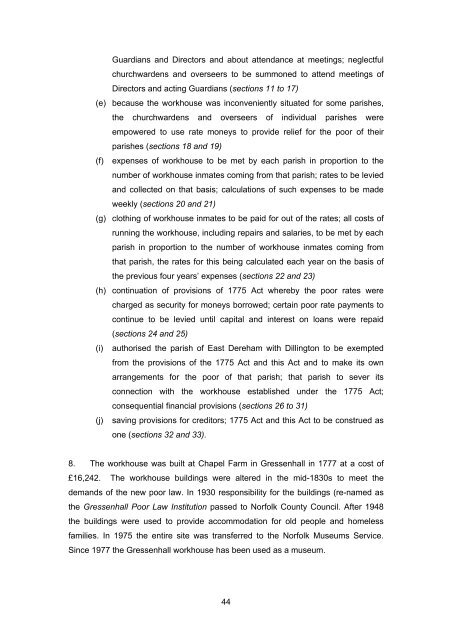Poor Relief - Law Commission
Poor Relief - Law Commission
Poor Relief - Law Commission
You also want an ePaper? Increase the reach of your titles
YUMPU automatically turns print PDFs into web optimized ePapers that Google loves.
Guardians and Directors and about attendance at meetings; neglectful<br />
churchwardens and overseers to be summoned to attend meetings of<br />
Directors and acting Guardians (sections 11 to 17)<br />
(e) because the workhouse was inconveniently situated for some parishes,<br />
the churchwardens and overseers of individual parishes were<br />
empowered to use rate moneys to provide relief for the poor of their<br />
parishes (sections 18 and 19)<br />
(f) expenses of workhouse to be met by each parish in proportion to the<br />
number of workhouse inmates coming from that parish; rates to be levied<br />
and collected on that basis; calculations of such expenses to be made<br />
weekly (sections 20 and 21)<br />
(g) clothing of workhouse inmates to be paid for out of the rates; all costs of<br />
running the workhouse, including repairs and salaries, to be met by each<br />
parish in proportion to the number of workhouse inmates coming from<br />
that parish, the rates for this being calculated each year on the basis of<br />
the previous four years’ expenses (sections 22 and 23)<br />
(h) continuation of provisions of 1775 Act whereby the poor rates were<br />
charged as security for moneys borrowed; certain poor rate payments to<br />
continue to be levied until capital and interest on loans were repaid<br />
(sections 24 and 25)<br />
(i) authorised the parish of East Dereham with Dillington to be exempted<br />
from the provisions of the 1775 Act and this Act and to make its own<br />
arrangements for the poor of that parish; that parish to sever its<br />
connection with the workhouse established under the 1775 Act;<br />
consequential financial provisions (sections 26 to 31)<br />
(j) saving provisions for creditors; 1775 Act and this Act to be construed as<br />
one (sections 32 and 33).<br />
8. The workhouse was built at Chapel Farm in Gressenhall in 1777 at a cost of<br />
£16,242. The workhouse buildings were altered in the mid-1830s to meet the<br />
demands of the new poor law. In 1930 responsibility for the buildings (re-named as<br />
the Gressenhall <strong>Poor</strong> <strong>Law</strong> Institution passed to Norfolk County Council. After 1948<br />
the buildings were used to provide accommodation for old people and homeless<br />
families. In 1975 the entire site was transferred to the Norfolk Museums Service.<br />
Since 1977 the Gressenhall workhouse has been used as a museum.<br />
44
















